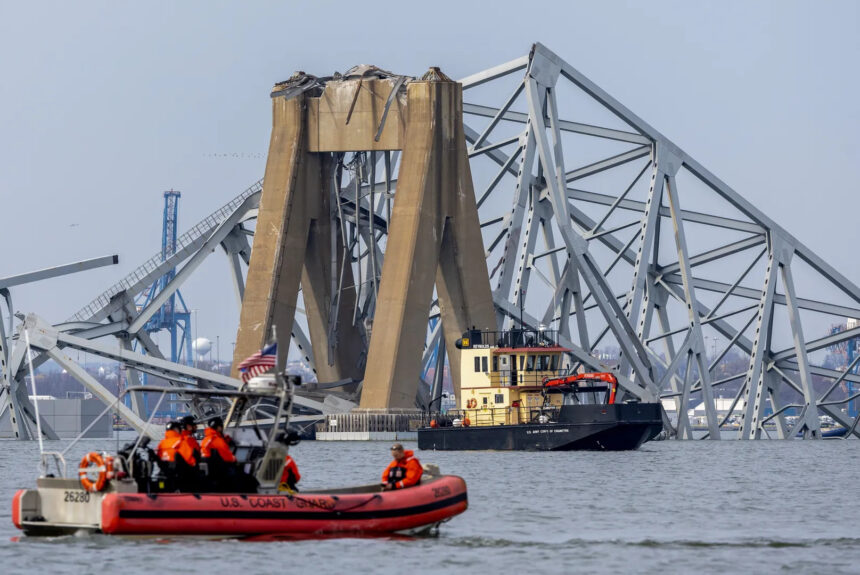One reason the phrase “they don’t make ‘em like they used to” is true is because it takes incredibly long to permit and build whatever we’re trying to make. The latest example is the Francis Scott Key Bridge in Baltimore, which could take up to a decade to reconstruct and cost anywhere from $2 billion to $5 billion. The original bridge was built in 1970 for $60 million, or $480 million after adjusting for inflation. The challenges of cleaning up the debris and rebuilding the bridge are yet another example of government-imposed barriers that delay timelines and increase costs for projects. To increase energy supplies, grow the economy, and help meet our environmental goals, policymakers would be wise to address this.
>>>READ: Shattering Barriers to Address Environmental Challenges
The cleanup of the Baltimore Bridge faces higher costs and prolonged schedules because of the Foreign Dredge Act. More than a century old, the law prohibits any foreign-built or chartered ships from dredging work in American shipping channels. Dutch or Belgian dredgers could remove wreckage and debris from the bridge collapse at a fraction of the time and cost. Repealing the Act would also allow the U.S. to use more environmentally friendly dredgers, improve shipping efficiency, and help prevent coastal erosion. And it’s just one sliver of the policy morass that contributes to ballooning budgets and timelines for projects.
Excessive bureaucracy, busy work for the consulting class, litigious activists, antiquated laws and regulations, and preferential treatment result in cost overruns and delayed project completion. President Biden’s stated preference to rebuild the Baltimore bridge with union labor and American steel is what New York Times columnist Ezra Klein coined everything-bagel liberalism. A little bit of everything for everyone sounds nice for campaign speeches and rewarding certain constituencies. Still, this unfocused policy with countless strings attached undermines the economic and long-term viability of the industries that policymakers want to succeed. It’s not only happening with the Baltimore Bridge cleanup and reconstruction but with semiconductors, clean energy, and other infrastructure projects.
>>>READ: Modern Mining, Outdated Permitting: Black Butte Copper Mine
If it is not death by a thousand regulatory cuts or meeting costly requirements to receive subsidies that hinder progress, it is outright obstructionism. Lengthy permitting processes and protracted lawsuits keep projects tied up for years. The Washington Post Editorial Board recently noted:
Environmental groups, including the Sierra Club, have joined a roughly six-year effort to stop transmission lines that would bring hydropower from Quebec to New England. They have opposed the development of solar energy facilities in the Mojave Desert. […]
Others, motivated by less high-minded causes, exploit the environmental review process to preserve views, prevent bothersome construction or stop the character of their areas from changing. Their main tool is NEPA, which not only requires environmental impact studies but also allows pretty much anybody to challenge in court a federal agency’s decision to greenlight projects on a virtually limitless set of environmental grounds.
Researchers at Stanford University studied 171 large energy infrastructure projects that completed federal environmental impact studies between 2010 and 2018. Nearly two-thirds of solar energy projects were litigated, they found, as were 31 percent of transmission lines and 38 percent of wind energy projects.
Court challenges often fail. Nikki Chiappa from the Breakthrough Institute noted that by 2020 federal agencies were winning some 80 percent of their cases. Attorneys for the Cardinal-Hickory Creek project seem confident that the injunction against the power line will be lifted. But litigation causes massive delays, raising the costs of multibillion-dollar energy projects. (Even before a project is challenged in court, the required environmental impact assessments can take as long as 14 years.) Delays cost big money — money that would be better spent fighting climate change, not court battles.
That is not to suggest that projects, whether they be a bridge or small modular nuclear reactor, should not meet a high bar for rigorous environmental and public safety standards. But when these standards hurt the health of the public and environment by delaying or killing important projects, it is time to reevaluate and fix this broken system. Policy reforms should empower project developers to meet that high bar faster. We can have the necessary transparency, oversight, and accountability without tying these projects in red tape and lawsuits for years. We have more knowledge, better tools, and access to data that should make it easier to build, not harder. The response to the bridge collapse of I-95 in Philadelphia last year offers a shining example of how efficient building in America can and should be. A temporary roadway for drivers opened in days and the rapid rebuild allowed the highway to reopen in mere months after the crash.
We don’t make ‘em like we used to, and in many respects that’s brought more affordable goods and better services to American families. There are innumerable innovations that make our lives more prosperous, healthier, happier, and easier. But if bad policy keeps those innovations on the shelf and out of consumers’ hands, it’s a loss for people and the planet.
The views and opinions expressed are those of the author’s and do not necessarily reflect the official policy or position of C3.
